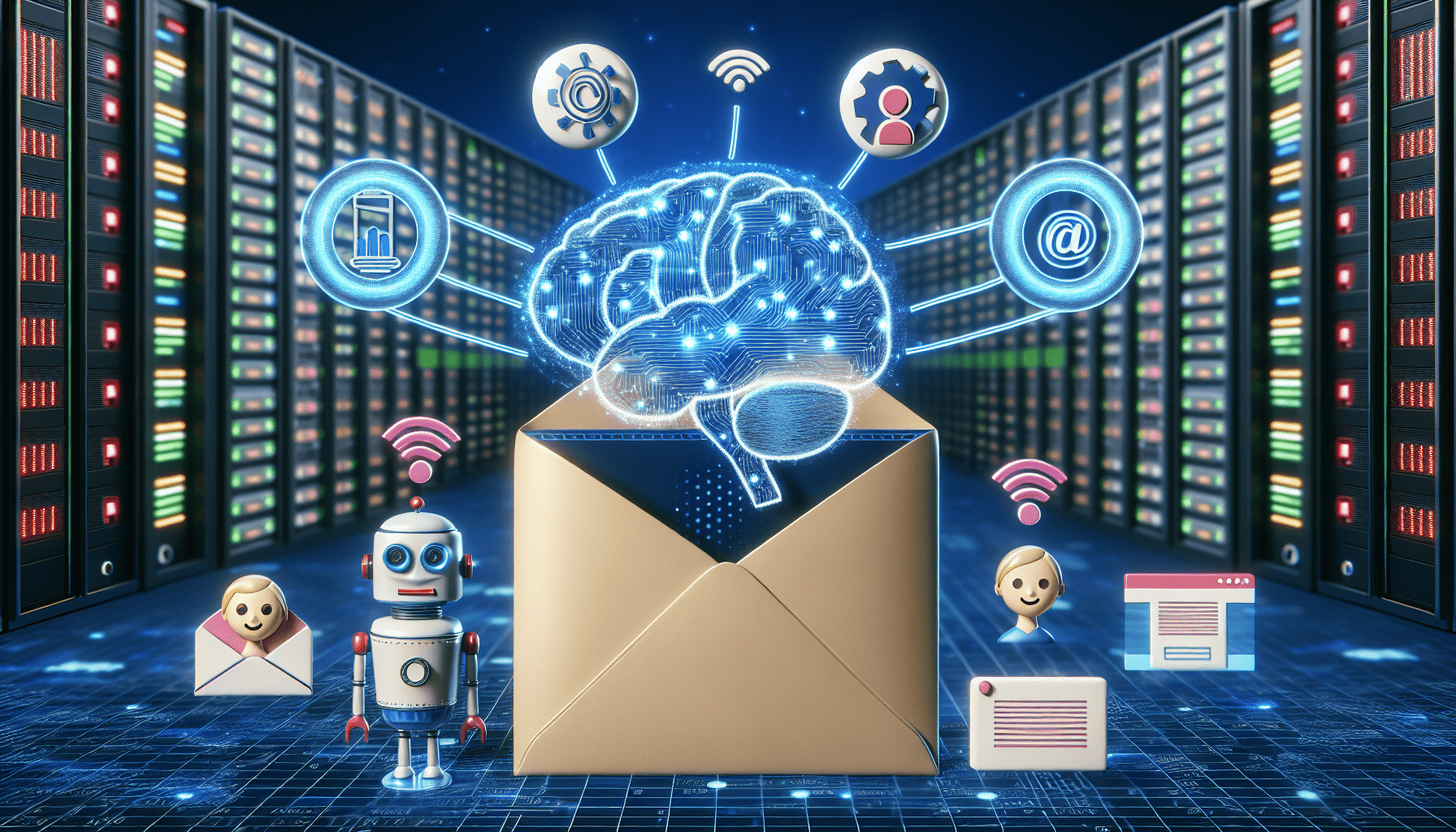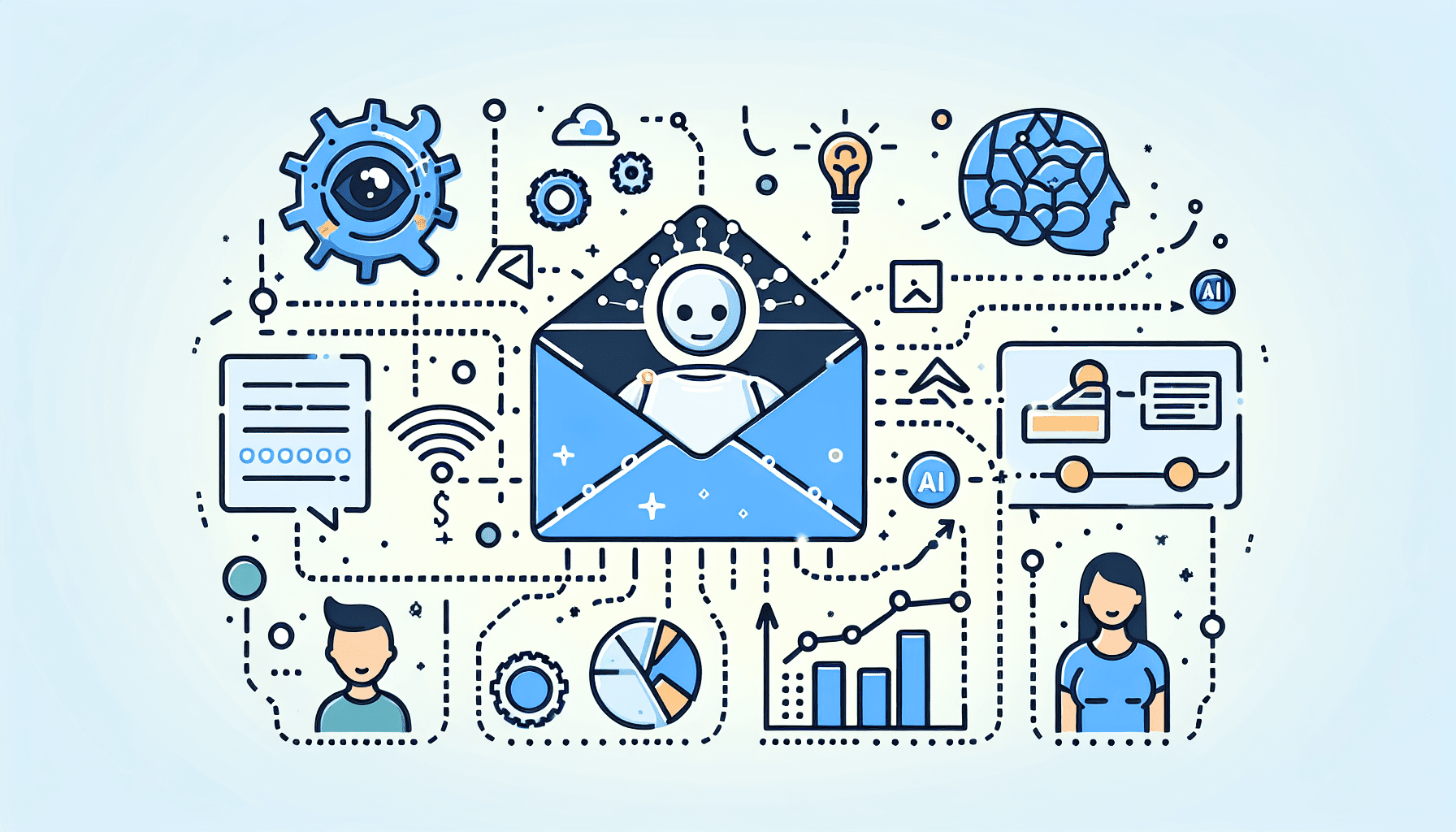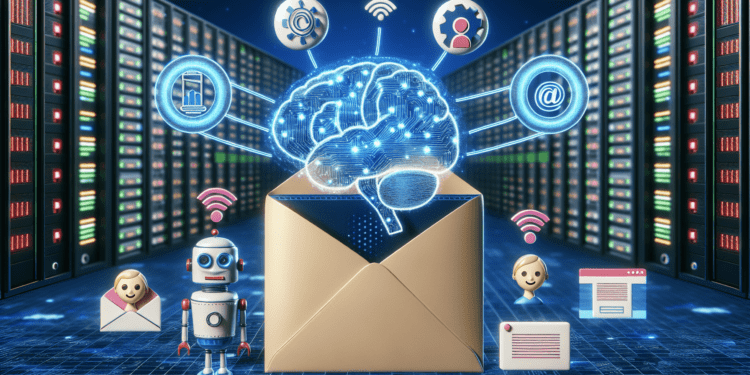You know that feeling when you receive an email that seems like it was written specifically for you? It catches your attention, piques your curiosity, and makes you feel connected to the brand or company sending it. Well, that’s the power of AI in email marketing. Artificial Intelligence has revolutionized the way businesses connect with their customers by enhancing personalization. In this article, we will explore the role of AI in email marketing and how it is transforming the way companies communicate with their audience. Get ready to dive into the world of AI-powered emails and discover how it can take customer engagement to a whole new level.

Introduction to AI in Email Marketing
In today’s digital age, email marketing plays a crucial role in establishing and nurturing relationships with customers. However, with the ever-increasing volume of emails that individuals receive on a daily basis, standing out from the crowd and capturing the recipient’s attention has become more challenging than ever before. This is where Artificial Intelligence (AI) comes into play. AI is revolutionizing the world of email marketing by enhancing personalization and creating more targeted and engaging campaigns.
Definition of AI
AI refers to the development of computer systems that can perform tasks that would generally require human intelligence. It relies on algorithms and machine learning to analyze data, make predictions, and automate processes. In the context of email marketing, AI enables marketers to extract valuable insights from customer data, automate email campaigns, and deliver highly personalized content.
Importance of Personalization in Email Marketing
Personalization is the key to making your emails stand out and resonate with your audience. By tailoring your emails to fit the unique preferences and needs of your customers, you can significantly increase engagement and conversion rates. According to a study by Accenture, 91% of consumers are more likely to shop with brands that provide relevant offers and recommendations. AI empowers marketers to deliver personalized experiences at scale, leveraging data to understand customer behaviors and preferences.
Introduction to Email Marketing
Email marketing is a highly effective tool that allows businesses to communicate directly with their audience and build meaningful relationships. It involves sending targeted emails to a group of subscribers who have willingly provided their contact information, showing interest in the company’s products or services. Email marketing is cost-effective, efficient, and provides a high return on investment (ROI). However, with increased competition and the ever-changing digital landscape, it is essential for marketers to leverage AI to take their email marketing strategies to the next level.
Benefits of AI in Email Marketing
The integration of AI in email marketing offers a multitude of benefits that can greatly enhance your marketing efforts.
Improved Customer Experience
One of the primary advantages of AI in email marketing is the ability to provide a superior customer experience. By leveraging AI algorithms, you can analyze customer data, including past purchases, browsing behaviors, and demographics, to understand their preferences and needs better. With this information, you can deliver highly personalized emails, tailored to each individual’s interests. This level of personalization creates a more engaging and relevant experience, leading to higher customer satisfaction and loyalty.
Higher Engagement and Conversion Rates
By delivering personalized content to your subscribers, AI can significantly increase engagement rates. Personalized emails have been shown to generate higher open and click-through rates compared to generic, mass emails. AI algorithms can identify patterns and trends in customer behaviors and preferences, allowing you to send targeted and timely emails that resonate with your audience. This results in higher conversion rates, as customers are more likely to take the desired action when presented with offers that are relevant to their interests.
Cost and Time Savings
AI-powered automation can streamline and optimize your email marketing processes, saving both time and resources. With AI algorithms handling tasks such as segmenting your audience, generating personalized content, and optimizing send times, you can focus on other aspects of your marketing strategy. Furthermore, AI can analyze large amounts of data in real-time and provide valuable insights, eliminating the need for manual data analysis. This not only saves time but also allows you to make data-driven decisions that can improve the effectiveness of your email marketing campaigns.
Types of AI Algorithms Used in Email Marketing
To fully grasp the potential of AI in email marketing, it is essential to understand the different types of AI algorithms utilized in this field.
Machine Learning Algorithms
Machine learning algorithms enable computers to learn from past data and make predictions or decisions without explicit programming. In email marketing, machine learning algorithms can be used to analyze customer data and behavior, identify patterns and trends, and generate personalized recommendations or content. For example, a machine learning algorithm can analyze a customer’s purchase history and browsing behavior to predict their future preferences and needs, allowing you to design targeted email campaigns.
Natural Language Processing Algorithms
Natural Language Processing (NLP) algorithms enable computers to understand and interpret human language. In email marketing, NLP algorithms can be utilized to analyze the text of emails, customer responses, and social media data to gain insights into customer sentiments, preferences, and intentions. By employing NLP algorithms, you can extract valuable information from unstructured data and use it to personalize your email content or improve your customer service.
Predictive Analytics Algorithms
Predictive analytics algorithms utilize historical data and statistical modeling techniques to predict future outcomes. In email marketing, these algorithms can be used to forecast customer behaviors or campaign performance accurately. For instance, predictive analytics algorithms can identify the most effective subject lines or content elements that lead to higher engagement and conversions. By leveraging these algorithms, you can optimize your email marketing campaigns and achieve better results.
Enhancing Personalization with AI in Email Marketing
Personalization is key to successful email marketing, and AI can take personalization to the next level by leveraging advanced techniques.
Segmentation and Targeting
AI algorithms make it easier than ever to segment your email list and target specific groups of subscribers based on their behaviors, preferences, and demographics. By analyzing customer data, AI can divide your audience into segments, allowing you to deliver highly relevant and personalized content to each group. Whether it’s based on purchase history, browsing behavior, or location, segmentation and targeting enable you to tailor your emails to the unique needs and interests of each segment, maximizing engagement and conversion rates.
Dynamic Content Generation
With AI, you can create and deliver dynamic content that adapts in real-time based on the recipient’s preferences and behaviors. By leveraging machine learning algorithms, AI can analyze customer data and generate personalized content that resonates with each individual. For example, if a customer has shown a preference for a certain type of product or has interacted with specific content on your website, AI can automatically generate email content that showcases similar products or content, increasing the chances of engagement and conversion.
Behavioral Tracking and Recommendations
AI-powered behavioral tracking can help you gain valuable insights into your customers’ actions and intent. By monitoring customer behaviors, such as website visits, clicks, or email interactions, AI algorithms can identify patterns and trends that can be used to make accurate recommendations. For example, if a customer has added items to their cart but hasn’t completed the purchase, AI can send an email with personalized recommendations or a special offer to encourage the customer to finalize their purchase. By leveraging AI-driven behavioral tracking and recommendations, you can create a tailored experience that encourages customer engagement and drives conversions.

Improving Email Subject Lines with AI
The subject line of an email is often the first impression you make on your audience, and AI can help you craft subject lines that are both attention-grabbing and personalized.
Generating Personalized Subject Lines
AI algorithms can analyze customer data and generate subject lines that are personalized to each individual. By leveraging machine learning algorithms, AI can identify patterns and trends in subject line performance, such as open rates or click-through rates, and use this data to generate subject lines that resonate with your audience. For example, if an AI algorithm determines that subject lines with a sense of urgency perform well with a specific segment of your audience, it can automatically generate subject lines that evoke urgency for that group.
A/B Testing and Optimization
AI can also assist in optimizing and testing different subject lines to determine the most effective ones. By using A/B testing techniques, AI can segment your audience and send different subject lines to each group to compare performance. AI algorithms can then analyze the results and identify the subject line that generates the highest engagement or conversion rates. This iterative process allows you to continually optimize your subject lines and improve the effectiveness of your email marketing campaigns.
Automating Email Marketing Campaigns with AI
AI-powered automation can streamline and optimize your email marketing campaigns, allowing you to deliver the right content to the right audience at the right time.
Automated Triggered Emails
AI algorithms can automatically trigger emails based on predefined criteria or customer behaviors. For example, if a customer abandons their shopping cart, an AI algorithm can send an automated email with a gentle reminder or a special offer to encourage them to complete their purchase. By automating triggered emails, you can deliver timely and relevant messages to your customers, increasing engagement, and driving conversions.
Drip Campaigns
Drip campaigns are a series of pre-scheduled emails that are sent to subscribers over a designated period. AI-powered automation can optimize the timing and content of drip campaigns based on customer behaviors and preferences. By leveraging machine learning algorithms, AI can analyze customer actions and make data-driven decisions, such as when to send the next email or what content to include. This ensures that your drip campaigns are tailored to each subscriber’s journey, enhancing engagement and nurturing relationships.
Time and Frequency Optimization
Determining the optimal time and frequency to send emails can be a challenge for marketers. With AI, you can leverage advanced analytics and machine learning algorithms to identify the best times to reach your audience. By analyzing historical data and customer behaviors, AI algorithms can determine when your subscribers are most likely to engage with your emails and optimize the send times accordingly. Additionally, AI can analyze engagement metrics in real-time and adjust the frequency of your emails to avoid overwhelming your subscribers or being overlooked.
AI-Powered Email Analytics
AI can provide valuable insights and analytics to monitor and optimize the performance of your email marketing campaigns.
Monitoring and Analyzing Email Campaign Performance
AI algorithms can analyze vast amounts of data from your email campaigns and provide actionable insights. From open rates to click-through rates, AI can identify trends and patterns that can help you understand what is working and what needs improvement. For example, AI can identify specific segments of your audience that are highly responsive and adjust your targeting strategies accordingly. By monitoring and analyzing campaign performance, you can make data-driven decisions and continuously optimize your email marketing strategy.
Predictive Analytics for Customer Behavior
AI can leverage predictive analytics algorithms to forecast customer behaviors and preferences. By analyzing historical data and customer interactions, AI algorithms can identify signals that indicate future customer actions. For example, if a customer has consistently engaged with a specific type of content or made similar purchases in the past, AI can predict their future preferences and deliver targeted emails to align with their anticipated interests. Leveraging predictive analytics enables you to proactively cater to customer needs and drive higher engagement and conversions.
Email Deliverability Optimization
AI can also assist in optimizing email deliverability, ensuring that your emails make it to your subscribers’ inboxes. By analyzing recipient engagement, spam filters, and other factors that influence deliverability, AI algorithms can identify potential issues and suggest improvements. For example, AI can flag words or phrases that may trigger spam filters and recommend alternative wording. By optimizing email deliverability, you can maximize the reach and impact of your email marketing campaigns.
Challenges and Considerations in AI-Driven Email Marketing
While AI presents many opportunities, it also comes with its own set of challenges and considerations that marketers must be aware of.
Privacy and Data Protection
With the increased use of AI in email marketing, the collection and utilization of customer data have become more intricate. It is crucial to prioritize privacy and data protection when implementing AI in your email marketing strategy. Ensuring compliance with relevant data protection regulations, obtaining explicit consent for data collection, and implementing robust security measures are vital to building trust with your customers and protecting their personal information.
Ethical Use of AI in Email Marketing
As AI becomes more advanced, it is essential to consider the ethical implications of its use in email marketing. Marketers must ensure that AI algorithms are fair and unbiased and do not perpetuate discrimination or exclude certain groups. Additionally, it is crucial to be transparent with your customers about the use of AI in your email campaigns and provide them with the option to opt-out or control the level of personalization they receive. Striking a balance between personalization and privacy is essential to ethical AI-driven email marketing.
Balancing Automation and Human Touch
While AI-powered automation can streamline processes and enhance personalization, it is essential to maintain a human touch in your email marketing campaigns. Customers value genuine interactions and personalized experiences that go beyond automated responses. Finding the right balance between automation and human touch is crucial to building meaningful relationships with your audience. In areas such as customer service, it is essential to ensure that AI-powered solutions are supplemented with human support to provide a personalized and empathetic experience.
Examples of Successful AI-Driven Email Marketing
To understand the impact of AI in email marketing, let’s explore a few real-world examples of successful campaigns.
Case Study 1: Personalized Recommendations
An online retailer utilized AI algorithms to analyze customer data, including past purchases and browsing behaviors, to generate highly personalized product recommendations. By sending emails featuring recommended products based on each individual’s preferences, the retailer achieved a 30% increase in click-through rates and a 20% increase in conversion rates. The AI-powered recommendations provided customers with a personalized shopping experience, increasing overall customer satisfaction.
Case Study 2: Dynamic Content in Real-Time
A travel agency leveraged AI to deliver dynamic content in real-time based on customer behaviors and preferences. By analyzing website interactions and previous travel bookings, AI algorithms generated personalized travel recommendations for each customer. The agency sent emails with real-time offers and destination suggestions, resulting in a 25% increase in bookings and a 15% increase in email engagement. The dynamic content provided customers with tailored options, enhancing their overall travel planning experience.
Case Study 3: Behavior-Based Triggers
A subscription-based service employed AI-enabled behavior-based triggers to engage inactive customers and reduce churn. By monitoring customer interactions and identifying patterns of disengagement, AI algorithms automatically triggered personalized emails with exclusive offers or reminders. This approach resulted in a 40% decrease in customer churn and a 25% increase in re-engagement. The behavior-based triggers allowed the service to reconnect with customers on a personal level, significantly improving customer retention.
Future Trends and Opportunities in AI Email Marketing
As AI continues to evolve, there are several future trends and opportunities that marketers should keep an eye on.
Advancements in AI Technology
AI technology is continuously advancing, offering marketers exciting possibilities for the future of email marketing. From more sophisticated machine learning algorithms to improved natural language processing capabilities, AI will enable even more precise personalization and dynamic content generation. Furthermore, advancements in AI-driven predictive analytics will allow marketers to anticipate customer needs and preferences with greater accuracy, resulting in more impactful email campaigns.
Integration of AI with other Marketing Channels
AI has the potential to seamlessly integrate with other marketing channels, creating a cohesive and personalized customer experience. By leveraging AI across various channels, such as social media, website personalization, and chatbots, marketers can provide a consistent brand experience and tailor their messaging based on customer behaviors and preferences. This integration will enable marketers to orchestrate sophisticated, AI-powered omnichannel marketing strategies that drive engagement and conversions.
Personal AI Email Assistants
The rise of personal AI assistants, such as Siri and Alexa, presents new opportunities for email marketing. As these assistants become more prevalent and intelligent, marketers can leverage them to deliver personalized email experiences. For example, customers could receive email summaries or recommendations from their personal AI assistant based on their preferences and behaviors. Personal AI email assistants can offer a unique and convenient way for customers to interact with emails, increasing engagement and opening up new channels for communication.
In conclusion, AI is revolutionizing email marketing by enhancing personalization, optimizing automation, and providing valuable insights. From improving customer experience to increasing engagement and conversion rates, AI offers a multitude of benefits for marketers. By leveraging machine learning, natural language processing, and predictive analytics algorithms, marketers can create highly targeted and personalized email campaigns that resonate with their audience. However, it is important to consider the challenges and ethical considerations associated with AI-driven email marketing. By striking a balance between automation and human touch and prioritizing privacy and data protection, marketers can successfully harness the power of AI to enhance their email marketing strategies and drive business growth.










